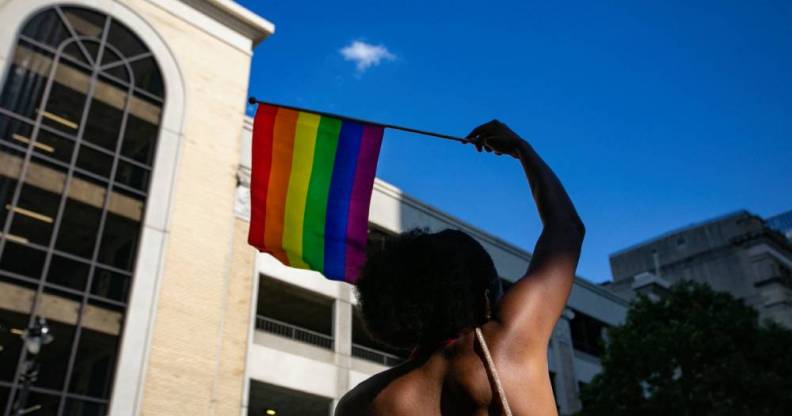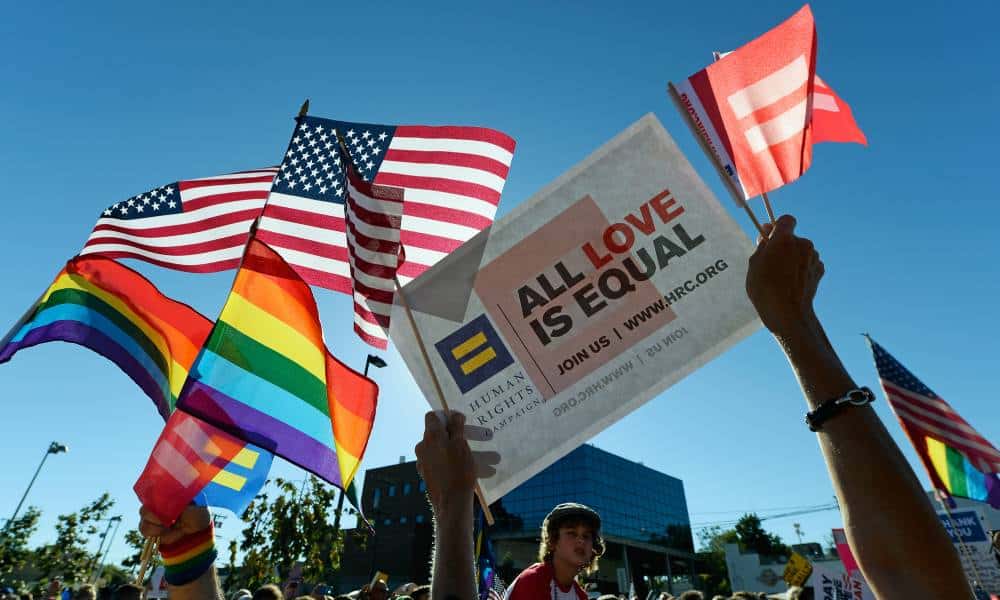Prop 8: Same-sex marriage ban could finally be cut from California constitution amid Supreme Court fears

LGBTQ+ leaders in Califonira are pushing to remove the archaic same-sex marriage ban from the state’s constitution. (Allison Joyce/AFP via Getty)
LGBTQ+ lawmakers want to remove Prop 8 from California’s constitution amid fears the Supreme Court could overturn same-sex marriage protections.
LGBTQ+ advocates worried rulings enshrining same-sex marriage across the US could be next after the Supreme Court overturned Roe v Wade in June.
Conservative justice Clarence Thomas suggested the decision to gut abortion rights could open the opportunity to reconsider “all of this court’s substantive due process precedent” including rulings that legalised contraceptives and same-sex marriage.
Members of California’s LGBTQ caucus have pushed for a ballot measure to have voters officially remove Proposition 8 from the state’s constitution. Proposition 8 was approved by voters back in 2008, and provided that “only marriage between a man and a woman is valid or recognised in California”.
A district court ruled Prop 8 was unconstitutional in 2010, but the measure still has remained in the state constitution until it can be removed by a voter appeal.
Assembly member Evan Low, a San Jose Democrat and chair of the California legislature’s LGBTQ caucus, told the San Francisco Chronicle that he was horrified to see the Supreme Court overturning Roe v Wade.
“It’s a nightmare to relive this pain that we thought we put away tightly and neatly in a little box,” he said. “I’m just lost for words to know that we could relive this again.”
Low said he’s long wanted to remove Prop 8 from the state’s constitution, but some advocates believed it would “poke the bear”, creating an unnecessary fight.
He believes Californians’ views have evolved since Prop 8 was first approved, and that people would vote to overturn the hateful ban.
“Californians believe in love, simply put,” Low said.

LGBTQ+ lawmakers think Californians “believe in love” and would vote to remove Prop 8 from the state’s constitution. (Getty/Kevork Djansezian)
Margaret Russell, a professor at Santa Clara University, told KGO it was “wise” for lawmakers to “look at this” and try to remove Prop 8 from the California constitution.
She repeated the point that the recent Supreme Court ruling could put other previous court decisions at risk, including the 2010 ruling striking down the same-sex marriage ban.
“The very fact that the Supreme Court of the United States is looking at this again means that that lower 2010 decision could be revisited,” Russell said.
Sources involved in the discussions told the San Francisco Chronicle that LGBTQ+ lawmakers considered if the measure to strike down Prop 8 should appear on the ballot this November or wait until after the 2024 presidential election.
The group reportedly decided to wait until 2024 as there was a worry the effort, if put before voters this fall, could compete with other pressing resources. This included a desire to focus on abortion rights.
But organisers have already drafted language for the amendment and are seemingly ready to move on it when they feel the time is right.
Samuel Garrett-Pate – a spokesperson for Equality California, one of the state’s largest LGBTQ+ advocacy groups – told the San Francisco Chronicle the focus is “100 per cent” on “safeguarding access to abortion and reproductive freedom”.
“Any conversation about a 2024 ballot measures won’t come until after November 2022 because we can’t afford to take our eye off that ball,” Garrett-Pate said.
Carolyn Wysinger, president of SF Pride, told KGO she thinks it’s necessary for Prop 8 to be removed from the California state constitution, and vowed to keep fighting until it is gone.
“We have come so far with things and opinions about same-sex marriage, but so many people are just coming to that opinion that they are just now realizing how vulnerable it still is,” Wysinger said.
She added that LGBTQ+ advocates have to remain “vigilant” even in a “blue state like California”.

